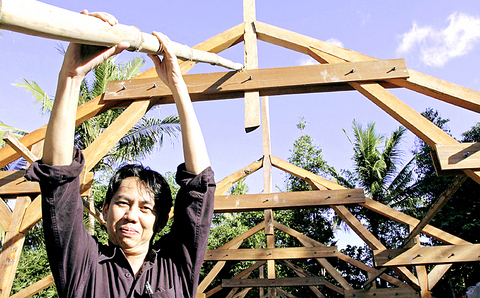Many Indonesians would have survived a deadly earthquake last month if houses had been built out of bamboo and other flexible materials, says an architect on a mission to transform devastated villages.
Eko Prawoto, who is working with homeless survivors in Ngipikan, a village in an area hard-hit by the quake that rocked Central Java and Yogyakarta, blames poor construction techniques for the huge loss of life and injuries.
"Many people who died in this earthquake died because of the brick walls that fell on them," he said.

PHOTO: AFP
The 6.3-magnitude temblor killed 5,800 people, injured up to 40,000 people and destroyed or damaged almost 600,000 houses in the heavily-populated area, which like much of Indonesia faces a constant risk of serious earthquakes.
Many of the houses that were damaged or flattened were built of brick and concrete and featured little reinforcement to resist the shockwaves of the quake, Prawoto says.
A preliminary assessment by the government's Development Planning Agency (Bappenas) also blamed poor construction for the high injury and death toll.
A bookshop and some houses in Yogyakarta built after Prawoto's mostly timber designs survived the May 27 quake undamaged, were his first experiments in quake-resistant construction.
"It's a wooden structure -- which is elastic -- and absorbs shocks ... During an earthquake, you have pushing and pulling forces. Each junction should resist these kind of forces," he said.
In Java, as in much of Indonesia, residences made of bamboo and timber are generally looked down upon as poor people's housing, whereas concrete and brick are viewed as symbols of modernity and rising wealth, Prawoto said.
Nevertheless in the aftermath of the quake, many traumatized villagers now fear living or even sitting inside brick or concrete buildings.
"It's a traumatic experience for them," he said.
For Ngipikan, where almost all the houses were destroyed, Prawoto has designed houses for rebuilding that use traditional materials but have a modern twist: The lower half of the house walls are brick and the upper half bamboo, with coconut trees used for the structural posts.
"It's important to apply bamboo and timber in a different way so as to give the image of newness," he said.
"We use brick but only 1m high -- so in case an earthquake happens again, if it falls down then it's not so dangerous," he said.
Assisted by donations from the local daily Kompas, Prawoto has begun building four of a planned 65 houses. He hopes the houses will serve as a model for other residents looking to build cheap but strong new homes.
With free labor provided by villagers and using recycled timber from the collapsed houses in combination with low-cost bamboo, he estimates each house will cost 10 million rupiah (US$1,060).
The government has promised to pay 30 million rupiah to quake victims whose houses were destroyed, but Prawoto suspects such assistance will take months to be disbursed and people cannot wait that long.

Kehinde Sanni spends his days smoothing out dents and repainting scratched bumpers in a modest autobody shop in Lagos. He has never left Nigeria, yet he speaks glowingly of Burkina Faso military leader Ibrahim Traore. “Nigeria needs someone like Ibrahim Traore of Burkina Faso. He is doing well for his country,” Sanni said. His admiration is shaped by a steady stream of viral videos, memes and social media posts — many misleading or outright false — portraying Traore as a fearless reformer who defied Western powers and reclaimed his country’s dignity. The Burkinabe strongman swept into power following a coup in September 2022

‘FRAGMENTING’: British politics have for a long time been dominated by the Labor Party and the Tories, but polls suggest that Reform now poses a significant challenge Hard-right upstarts Reform UK snatched a parliamentary seat from British Prime Minister Keir Starmer’s Labor Party yesterday in local elections that dealt a blow to the UK’s two establishment parties. Reform, led by anti-immigrant firebrand Nigel Farage, won the by-election in Runcorn and Helsby in northwest England by just six votes, as it picked up gains in other localities, including one mayoralty. The group’s strong showing continues momentum it built up at last year’s general election and appears to confirm a trend that the UK is entering an era of multi-party politics. “For the movement, for the party it’s a very, very big

ENTERTAINMENT: Rio officials have a history of organizing massive concerts on Copacabana Beach, with Madonna’s show drawing about 1.6 million fans last year Lady Gaga on Saturday night gave a free concert in front of 2 million fans who poured onto Copacabana Beach in Rio de Janeiro for the biggest show of her career. “Tonight, we’re making history... Thank you for making history with me,” Lady Gaga told a screaming crowd. The Mother Monster, as she is known, started the show at about 10:10pm local time with her 2011 song Bloody Mary. Cries of joy rose from the tightly packed fans who sang and danced shoulder-to-shoulder on the vast stretch of sand. Concert organizers said 2.1 million people attended the show. Lady Gaga

SUPPORT: The Australian prime minister promised to back Kyiv against Russia’s invasion, saying: ‘That’s my government’s position. It was yesterday. It still is’ Left-leaning Australian Prime Minister Anthony Albanese yesterday basked in his landslide election win, promising a “disciplined, orderly” government to confront cost-of-living pain and tariff turmoil. People clapped as the 62-year-old and his fiancee, Jodie Haydon, who visited his old inner Sydney haunt, Cafe Italia, surrounded by a crowd of jostling photographers and journalists. Albanese’s Labor Party is on course to win at least 83 seats in the 150-member parliament, partial results showed. Opposition leader Peter Dutton’s conservative Liberal-National coalition had just 38 seats, and other parties 12. Another 17 seats were still in doubt. “We will be a disciplined, orderly